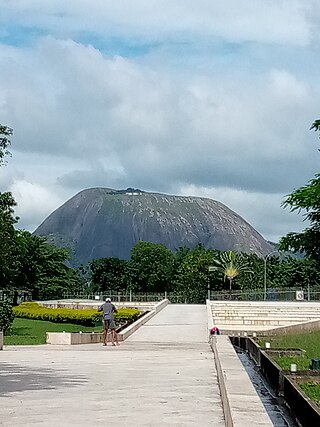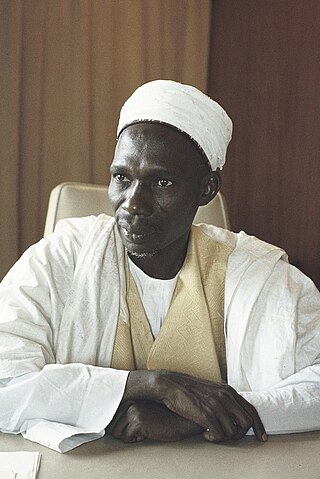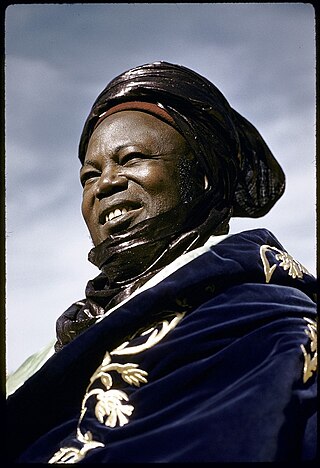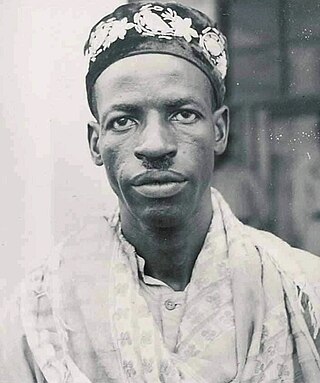
The history of Nigeria can be traced to the earliest inhabitants whose remains date from at least 13,000 BC through early civilizations such as the Nok culture which began around 1500 BC. Numerous ancient African civilizations settled in the region that is known today as Nigeria, such as the Kingdom of Nri, the Benin Kingdom, and the Oyo Empire. Islam reached Nigeria through the Bornu Empire between and Hausa Kingdom during the 11th century, while Christianity came to Nigeria in the 15th century through Augustinian and Capuchin monks from Portugal to the Kingdom of Warri. The Songhai Empire also occupied part of the region. Through contact with Europeans, early harbour towns such as Calabar, Badagry and Bonny emerged along the coast after 1480, which did business in the transatlantic slave trade, among other things. Conflicts in the hinterland, such as the civil war in the Oyo Empire, meant that new enslaved people were constantly being "supplied".

The Nigerian Civil War, also known as the Biafran War, was a civil war fought between Nigeria and the Republic of Biafra, a secessionist state which had declared its independence from Nigeria in 1967. Nigeria was led by General Yakubu Gowon, and Biafra by Lieutenant Colonel Chukwuemeka "Emeka" Odumegwu Ojukwu. The conflict resulted from political, ethnic, cultural and religious tensions which preceded the United Kingdom's formal decolonisation of Nigeria from 1960 to 1963. Immediate causes of the war in 1966 included a military coup, a counter-coup, and anti-Igbo pogroms in the Northern Region. The pogroms and the exodus of surviving Igbos from the Northern Region to the Igbo homelands in the Eastern Region led the leadership of the Eastern Region to conclude that the Nigerian federal government would not protect them and that they must protect themselves in an independent Biafra.

Sir Abubakar Tafawa Balewa was a Nigerian politician who served as the first and only prime minister of Nigeria upon independence. A conservative Anglophile, he favoured maintaining close ties with the British. During his first few years in office as prime minister, Nigeria was a constitutional monarchy with Elizabeth II reigning as Queen of Nigeria, until Nigeria became a republic in 1963. He was both a defender of Northern special interests and an advocate of Nigerian reform and unity.

Northern Nigeria was an autonomous division within Nigeria, distinctly different from the southern part of the country, with independent customs, foreign relations and security structures. In 1962, it acquired the territory of the British Northern Cameroons, which voted to become a province within Northern Nigeria.

Ado Bayero CFR, LLD, JP was the Emir of Kano from 1963 to 2014.

Chief Samuel Ládòkè Akíntọ́lá otherwise known as S.L.A. was a Nigerian politician, aristocrat, orator, and lawyer. He served as Oloye Aare Ona Kakanfo XIII of Yorubaland and served as premier of Western Nigeria from independence in 1960 till his assassination in 1966.

Sir Ahmadu Bello, famously known as Sardauna of Sokoto, was a conservative Nigerian statesman who was one of the leading northern politicians in 1960 and served as its first and only premier from 1954 until his assassination in 1966, in which capacity he dominated national affairs for over a decade.
The Action Group (AG) was a Nigerian nationalist political party established in Ibadan on 21 March 1951, by Chief Obafemi Awolowo. The party was founded to serve as the platform for realizing his preliminary objective of mobilizing Western Nigerians to forestall the NCNC control of the Western Region and the subsequent aim of cooperating with other nationalist parties to win independence for Nigeria. It benefited immensely from the relationships developed in the Egbe Omo Oduduwa formed in Awolowo's days in London as a student.

Colonial Nigeria was ruled by the British Empire from the mid-nineteenth century until 1 October 1960 when Nigeria achieved independence. Britain annexed Lagos in 1861 and established the Oil River Protectorate in 1884. British influence in the Niger area increased gradually over the 19th century, but Britain did not effectively occupy the area until 1885. Other European powers acknowledged Britain's dominance over the area in the 1885 Berlin Conference.

The First Republic was the republican government of Nigeria between 1963 and 1966 governed by the first republican constitution. The country's government was based on a federal form of the Westminster system. The period between 1 October 1960, when the country gained its independence and 15 January 1966, when the first military coup d’état took place, is also generally referred to as the First Republic. The first Republic of Nigeria was ruled by different leaders representing their regions as premiers in a federation during this period.

Mallam Aminu Kano was a Nigerian radical opposition political leader, teacher, poet, playwright, and trade unionist from Kano. He played an active role during the transition from British colonial rule to independence, the First Republic, Military rule, and the Second Republic. Representing the Kano East constituency, he served as the Deputy Government Chief Whip in the Federal House of Representatives. During Yakubu Gowon's administration, he served as the Federal Commissioner for Communications and the Federal Commissioner for Health. He was a vocal critic of British colonialism and its indirect rule policy in northern Nigeria. A self-described democratic humanist and reformer, Aminu combined his knowledge of Western and Islamic education to champion the liberation of the talakawa (commoners).

Hassan Usman Katsina, titled Chiroman Katsina, was a Nigerian general who was the last Governor of Northern Nigeria. He served as Chief of Army Staff during the Nigerian Civil War and later became the Deputy Chief of Staff, Supreme Headquarters.
Alhassan Dantata ; Arabic: ال حسان دان تاتا, romanized: al-Ḥasan ɗan Tātā; 1877 – 17 August 1955) was a Nigerian businessman and philanthropist. Through his trade with large British companies, he became one of the wealthiest men in West Africa during his time. He is the great-grandfather of Aliko Dangote, the wealthiest person in Nigeria and Africa.

Chief Victor Babaremilekun Adetokunboh Fani-Kayode, Q.C., SAN, CON was a leading Nigerian politician, aristocrat, nationalist, statesman and lawyer. He was elected deputy premier of the Western Region of Nigeria in 1963 and played a major role in Nigeria's legal history and politics from the late 1940s until his death in 1995.
The Northern People's Congress (NPC) is a political party in Nigeria. Formed in June 1943, the party held considerable influence in the Northern Region from the 1950s until the military coup of 1966. It was formerly a cultural organization known as Jamiyaar Mutanen Arewa. After the Nigerian Civil War of 1967, the NPC subsequently became a minor party.

The Potiskum Emirate is a traditional state in Nigeria, with headquarters in Potiskum, Yobe State. The emir holds the title "Mai".

The Kano Peoples Party was a Nigerian political party in the first republic. Formed in 1963, it soon became the second largest opposition party in Northern Nigeria overtaking the United Middle Belt Congress. In 1966, the Party was proscribed along with other political parties by the military.

General elections were held in Nigeria between October and December 1954. The Northern People's Congress emerged as the largest party, winning 84 of the 184 seats. However, the NPC only won seats in the Northern Region. Although the National Council of Nigeria and the Cameroons won the most seats in the Eastern and Western Regions, Action Group was the only party to win seats in all three regions.
Abdulkadir Dan Bawa was the 8th Fulani Emir of Ilorin. He succeeded his father, Shuaib Bawa as Emir in 1919. Bawa was appointed Emir on the recommendation of acting Provincial Resident in Ilorin, Kenneth Elphinstone. He reigned from 1920 to 1959, and witnessed most of the colonial constitutional reforms initiated after the founding of Nigeria in 1914.

Mallam Sa'adu Zungur was a Nigerian revolutionary, poet, jurist and nationalist who played an important role in Nigeria's independence movement particularly in Northern Nigeria. He is generally regarded as the father of 'radical politics' in Northern Nigeria. Zungur's political writings criticising the colonial government of Northern Nigeria, especially the emirate system, helped in laying the foundation for the principle of self-determination in Nigeria. His literary and political endeavors influenced a number of the leaders of the independence movement in Northern Nigeria, notably Aminu Kano and Isa Wali.













